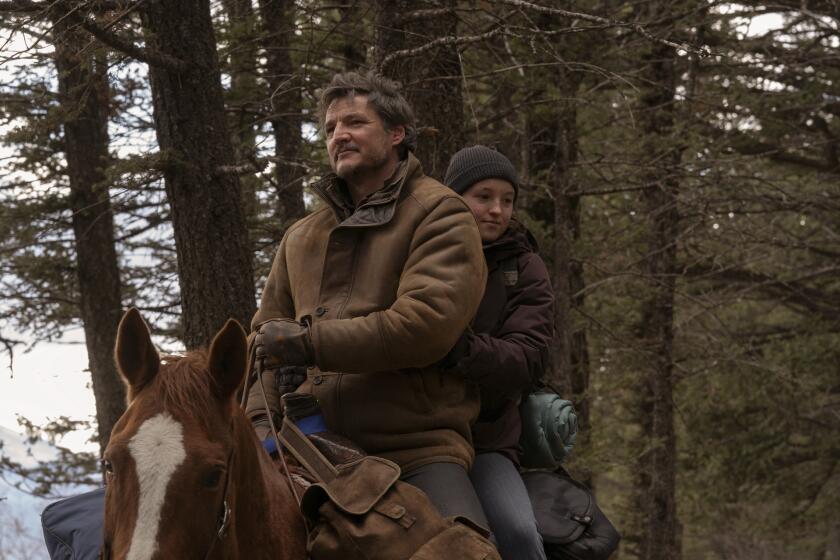THIS TIME THE ODYSSEY WON’T NEGLECT ‘BOSOMS’
- Share via
“I wanted to do something wicked.”
Everyone has such feelings at one time or another, but we’ll just have to assume that directing John Guare’s “Bosoms and Neglect” (opening today at the Odyssey Theatre) is about as far as Ron Sossi is willing to go when it comes to going public with confessions of nasty desires.
“I wanted to do this play three years ago, but couldn’t cast it,” he said. “I wound up doing ‘Marie and Bruce’ instead. ‘Bosoms’ is about two people who meet on the day their psychiatrist goes on vacation. In one sense, it’s a love story, but in another it’s about people who are dependent on psychological jargon and interpretation of their lives. It rakes the profession over the coals while being a great Gestalt session.
“It’s a risky comedy. Guare dares to make fun of cancer--one of the patients has a mother who’s revealed to him that she’s had breast cancer for two years. At one point, the couple stab each other with paper knives. The play has elements of Albee, Nichols & May and Woody Allen. Guare’s plays are always different. He takes chances other writers don’t.”
Sam Anderson and Andra Millian play the young couple, Frances Bay the mother.
As for the Odyssey’s upcoming season, Kurt Weill’s first American musical, “Johnny Johnson” (an anti-war work written in collaboration with Paul Green), is in the works, as well as two new plays by Steven Berkoff. One, called “Kvetch,” deals with Berkoff’s California impressions. The other is “Acapulco,” which, according to Sossi, focuses more specifically on the Hollywood film industry as Berkoff experienced it when he hung out in a Mexican cantina during the filming of “Rambo: First Blood Part II.” Berkoff played the Russian colonel who tortured our unofficial (and dubious, some would say) national hero. Sossi reports that Berkoff will work on the play more when he returns to portray Hitler in TV’s “War and Remembrance,” the sequel to “The Winds of War.” Berkoff’s penchant for evil genius is much in demand these days.
When was American pop culture last at home with a sense of style? One could make a case for the ‘30s. It was the decade of the Dust Bowl and the ghastly Depression, but it was also the decade typified by Fred Astaire. Depictions of blind ambition and success-for-its-own-sake almost always pointed to the bitter aftertaste of such preoccupations for that decade’s equivalent of our yuppies. Unlike our own era, the ‘30s did not confuse the product with the sale. Madonna would not have been a hit.
Norman Cohen has an affection for the ‘30s and their near chronological neighbors. He’s directed “Biography” and “Skylark” locally over the past few years, and on Thursday opens Philip Barry’s “The Philadelphia Story” at the Callboard.
“It was written in 1938, and saved the Theater Guild as well as Katharine Hepburn’s career,” Cohen said. “It deals with the Philadelphia Main Line milieu and an heiress who’s marrying a man who worked his way out of poverty. Everyone thinks she’s a kind of goddess, and that adulation has permeated her own idea of herself, until she learns how to become a human being.
“What I enjoy most about it is that it’s a comedy with wit and style. The ‘30s was a great decade for the theater, with Behrman, Barry, Sherwood, Ben Hecht and Charles MacArthur. So often the plays would appear to have superficial veneers, but in fact would contain allusions to the problems of society. They speak to us in an unforgettable way. I notice there’s a large adult population that supports the Megaw and Room for Theatre, which like to do these kinds of plays. A lot of it I’m sure is nostalgia. But a lot of people also feel disenfranchised from the general run of theater now.”
April 1 is the deadline for submissions to the South Coast Repertory’s Hispanic Playwrights Project, a new program directed by Jose Cruz Gonzalez that invites Latino writers into the theater. Three winners will have their works seen July 9-13, but other writers will also be invited to participate in seminars, discussions and workshops, and to find out firsthand what a life in the theater offers the writer who feels his voice is unheard. (Dramaturgy is also a part of the project.) The program’s emphasis is less on success, or finished product, than it is on development. Scripts should be mailed to Jose Cruz Gonzalez, Hispanic Playwrights Project, South Coast Repertory, P.O. Box 2197, Costa Mesa 92628-1197. Information: (714) 957-2602.
More to Read
The biggest entertainment stories
Get our big stories about Hollywood, film, television, music, arts, culture and more right in your inbox as soon as they publish.
You may occasionally receive promotional content from the Los Angeles Times.










